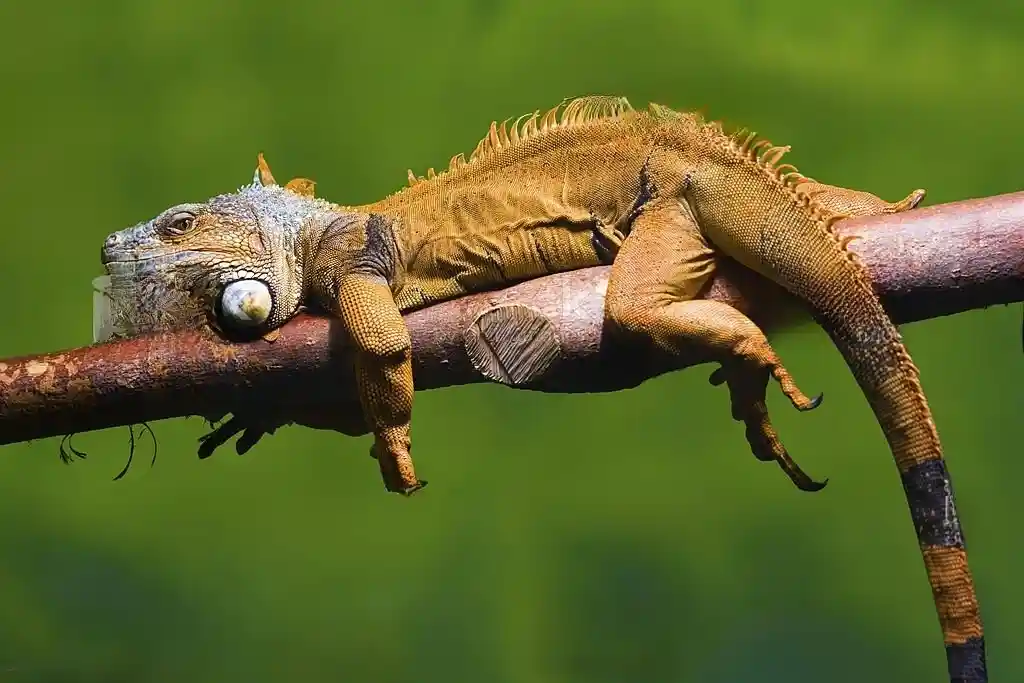If your Bearded Dragon isn’t pooping, it may be due to a lack of hydration or an incorrect diet.
It is important to ensure that your Bearded Dragon is getting adequate hydration and a balanced diet.
If your Bearded Dragon is dehydrated, try offering it filtered water or a shallow bowl of water for them to drink from.
Make sure that their diet includes plenty of greens, such as collard greens, turnip greens, and mustard greens, as well as a variety of insects like crickets, mealworms, and waxworms.
Offering your Bearded Dragon calcium supplements and a multivitamin can also help with digestion.
In this article, we will discuss the most effective tips and tricks on how to get your bearded dragon to poop without too much hassle.
Reduce Stress
Bearded dragons, like all reptiles, can become stressed due to various factors.
Stress management is important for the health of your dragon and it’s essential that we take steps in order to reduce their stress levels.
By providing an environment with the appropriate temperature, humidity, and hiding spots, you can create a more relaxed atmosphere for your pet.
Additionally, there are many activities such as regular handling or playing music that can help relieve some of the stress associated with captivity.
It’s also important to recognize signs of stress in dragons, including changes in behavior or appetite.
If any of these symptoms appear then it’s best to act fast so that they don’t worsen over time.
Warm Bath
Taking a warm bath is an effective way to help your bearded dragon relax and potentially relieve constipation.
This can be done by filling up the sink with lukewarm water, no more than two inches deep, and allowing your pet to soak for five to ten minutes.
As you observe them take in this soothing atmosphere, their muscles should begin to loosen and they may even start passing stool while still in the tub.
It’s important that the temperature of the water isn’t too hot or cold so make sure it feels comfortable on your wrist before placing your bearded dragon inside.
Make sure that all other distractions are away from them during this time such as noise or bright lights; having a quiet environment will also help reduce stress levels further.
Fruit Laxatives
Fruit laxatives can be effective in getting your bearded dragon to poop. There are several options available:
- Feeding them high-fiber fruits such as prunes, apples, and figs that act like a natural laxative for their digestive system.
- Adding a beardie laxative supplement which is a mixture of psyllium husk and other fibers specifically designed for reptiles.
- Incorporating veggie laxatives into their diet, such as cooked sweet potatoes or squash, which help stimulate the gut’s contractions and encourage bowel movements.
- Offering small amounts of canned pumpkin puree with no added sugar or spices as an occasional treat that helps promote digestion without causing discomfort or adverse side effects.
These methods will usually take effect within 24 hours if done consistently and monitored closely.
If you have tried these fruit laxatives but still have not seen any results after 48 hours it’s time to move on to another option – olive oil.
Olive Oil
Another way to help your bearded dragon poop is by using olive oil.
As a herpetologist or reptile veterinarian, I advise against using any kind of chemical laxatives on your pet as they can be too harsh for its delicate digestive system.
Olive oil has been known to act as a natural laxative and can help stimulate the bowels.
It’s important to note that you should only use it in moderation; adding just 1/2 teaspoon of olive oil per day into your beardie’s food should do the trick.
You may need to increase this amount if their fecal output remains low.
It’s also essential to ensure that your bearded dragon is getting enough water.
Dehydration often leads to constipation, so make sure your pet always has access to fresh water every day.
Additionally, providing them with plenty of leafy greens will add extra hydration and fiber to their daily diet which will encourage regular bowel movements.
If these tips don’t seem to be helping why your bearded dragon isn’t pooping then it could be time to consult a herpetologist or reptile vet.
Why Your Bearded Dragon Isn’t Pooping?
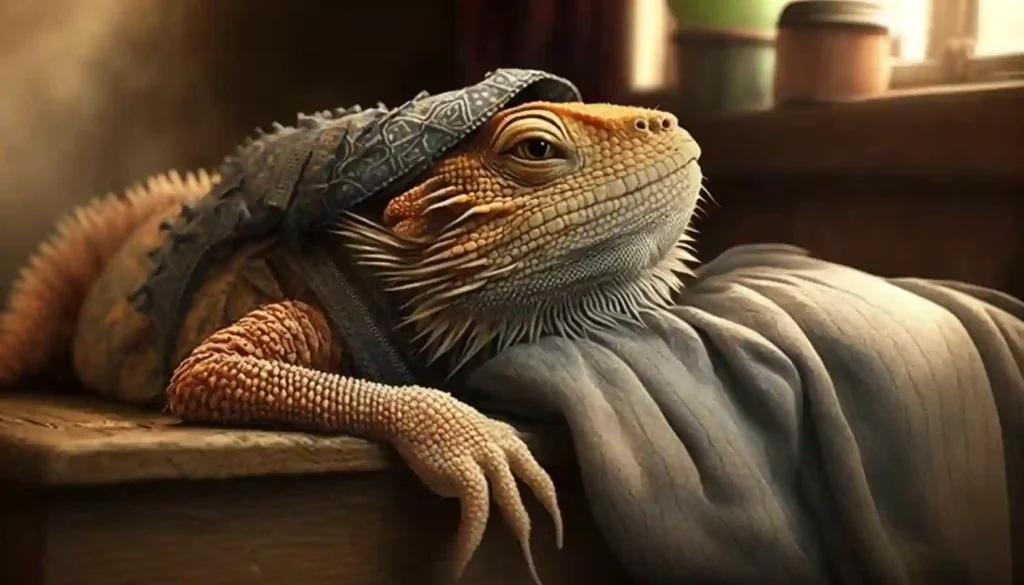
There are several common reasons why your bearded dragon may not be pooping.
Stress is a major factor that can cause the digestive tract to slow down or even shut down completely.
It’s important to ensure your pet has adequate space and hides available, as well as an appropriate temperature gradient in its enclosure for optimal comfort levels.
The habitat should also provide sufficient humidity so their skin doesn’t dry out too much.
Dehydration is another issue that could lead to impaction if left untreated, as it causes food matter to become stuck in the gastrointestinal system.
Be sure to offer fresh water daily, and consider misting them with warm water every other day or more frequently during hot summer days.
Inactivity due to inadequate environmental stimulation may also be a problem; make sure they have plenty of items like live plants, perches, rocks, and logs, which encourage climbing and exploring behaviors.
Lastly, improper diet can contribute to this issue – offering gut-loaded insects and supplementation with calcium/vitamin D3 twice a week will benefit their overall health tremendously.
Stress
Stress can have an impact on all areas of life for your pet reptile, including appetite, sleep, and digestion.
Managing this issue should be a top priority for any responsible owner.
| Stress Relief | Stress Reduction |
|---|---|
| Provide a secure habitat | Keep handling and disturbances to a minimum |
| Feed a varied diet that meets their nutritional needs | Introduce enrichment activities such as providing branches and other items they can climb or bask on |
| Feed varied diet that meets their nutritional needs | Ensure adequate space in the tank so they don’t feel crowded |
These are just some of the steps you can take to ensure your dragon has proper stress relief and reduction.
Other measures include giving them access to natural sunlight (or special UVB bulbs) when possible, mimicking day/night cycles with light timers, and consulting with herpetologists or a reptile veterinarian if needed.
Dehydration
Dehydration is like a slowly ticking time bomb waiting to explode; it can cause serious health issues in bearded dragons if not managed properly.
It’s important for pet owners to understand the signs of dehydration and how best to prevent it.
Dehydration symptoms include sunken eyes, wrinkled skin (especially along the neck), loss of appetite, lethargy, and poor stools or lack thereof.
If your dragon shows any of these signs then you should make sure they are getting adequate water intake.
Offering shallow dishes with clean water that your beardie can easily access is essential.
Misting their enclosure daily will provide hydration as well as humidity which helps promote healthy shedding.
Inactivity
Inactivity in bearded dragons can be caused by a variety of factors, including:
- not enough time spent basking;
- inadequate nutrition or hydration levels;
- and a lack of physical activity. In addition to these causes, brumation (periods of hibernation) may also lead to an inactive state for your beardie.
It is important to recognize the signs of inactivity so you can take appropriate action if needed. Symptoms of inactivity include:
- A decrease in appetite or complete refusal to eat.
- Lethargy – An unwillingness or inability to move around much during daylight hours.
- Weight loss- Unexplained weight loss that cannot be attributed to any other known cause should prompt further investigation into possible inactivity-related issues with your dragon’s health and diet.
If you suspect that your Bearded Dragon is inactive due to any number of potential causes listed above, it is important to seek veterinary advice immediately as this condition can quickly become life-threatening if left untreated.
With careful monitoring and proper environmental conditions, however, most cases of inactivity are reversible and very treatable with no long-lasting effects on your pet’s overall well-being.
An understanding of brumation and gravidity is necessary when dealing with potentially inactive bearded dragons as both processes will drastically affect their behaviors over extended periods of time which must be taken into account when making decisions about care and treatment options available for them.
Brumation And Gravidity
As a herpetologist, I can tell you that bearded dragons often go through brumation and gravidity.
Brumation is when the dragon’s metabolism slows down to conserve energy during cold months; similar to hibernation in mammals.
In this state, they experience reduced activity and may not eat as much or at all.
Gravidity is also common among female bearded dragons and occurs when she lays eggs.
During both of these states, your dragon may stop pooping for short periods of time – sometimes even weeks.
This is why it’s important to monitor their health while they are going through either one of these processes.
It’s also wise to adjust the temperature so they can be comfortable enough to eat properly and stay healthy overall.
How Long Can A Bearded Dragon Go Without Pooping?
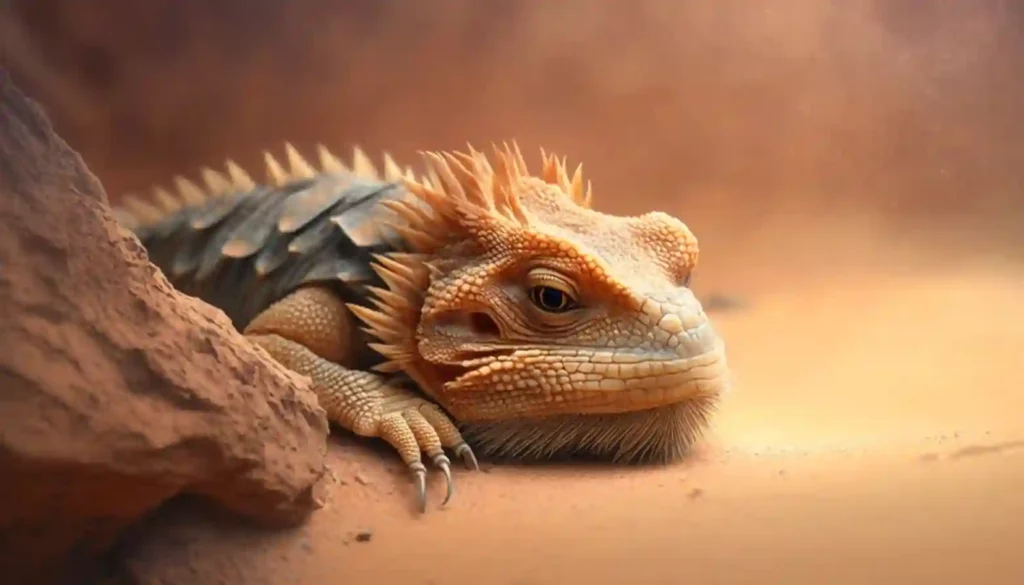
Bearded dragons can go long periods without pooping, depending on the individual dragon’s health and diet.
It is not uncommon for a bearded dragon to go up to three weeks without producing droppings.
However, if it has been longer than this time frame then your bearded dragon may be suffering from constipation or other digestive issues that need to be addressed by an experienced herpetologist or reptile veterinarian immediately.
| Health | Diet | Poop Frequency |
|---|---|---|
| Good | Balanced | Up To 3 Weeks Between Droppings |
| Poor | Unbalanced/Inadequate Nutrition | More Frequent Or No Droppings At All |
It is important for bearded dragons to have regular bowel movements in order to accommodate their natural metabolism and digestion process.
If they are deprived of these necessities, brumation pooping becomes more difficult, and unhealthy conditions such as impaction could become an issue with long-term consequences.
Therefore, monitoring the frequency of droppings should be done regularly to ensure your beardie’s well-being.
A healthy diet consisting primarily of leafy greens combined with occasional insects will help keep your bearded dragon’s digestive tract functioning properly so that you can avoid extended bouts of no poop production.
What Can I Feed My Bearded Dragon To Make Him Poop?
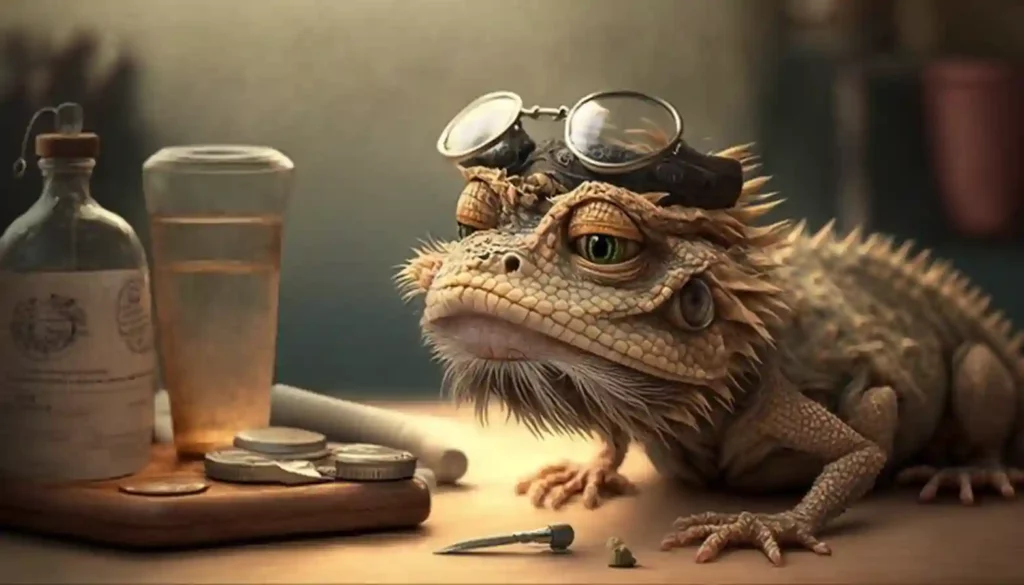
Bearded dragons are omnivorous and have unique dietary requirements that must be met for them to stay healthy.
Feeding your dragon a well-balanced diet is essential in order to ensure he or she gets the necessary nutrients needed for proper digestion, which includes the elimination of waste.
So what can you feed your bearded dragon to make him poop?
A good rule of thumb when it comes to feeding your beardie is providing variety.
This means offering a mix of fresh produce, insects, and commercial pellets with calcium supplements as needed.
A balanced diet should include leafy greens such as kale, collard greens, mustard greens, and dandelion leaves; vegetables like bell peppers, carrots, and squash; fruits (in moderation); crickets and other live prey items; and lastly reptile laxatives if recommended by a herpetologist or veterinarian.
Be sure not to overfeed him too much at one time because this can cause digestive problems leading to constipation or impaction.
When creating a meal plan for your bearded dragon keep in mind that some foods may help stimulate their bowels while others could potentially slow down digestion.
Doing research on the specific food item’s nutritional value will provide insight into how it affects the digestive system before feeding it to your pet.
How Long Can A Bearded Dragon Go Without Pooping During Brumation?
Brumation is an essential part of a bearded dragon’s life cycle and it can last for several months at a time.
During this period, the reptile will become less active, lower its metabolic rate, reduce food intake significantly, and even stop pooping altogether.
While some dragons may still pass stools on occasion during brumation, others may go up to two or three weeks without defecating.
It is important that you monitor your pet closely to make sure they are not becoming impacted by a lack of bowel movements.
If there appears to be no sign of them passing any stool after more than three weeks then contact your veterinarian right away as this could be indicative of a serious health issue.
It is also worth noting that while in brumation mode, a dragon’s body temperature should remain higher than its usual daily temperatures – typically around 30-32 degrees Celsius – which helps stimulate digestion.
Keeping an eye on this temperature level when trying to encourage your pet to poop again can help ensure they stay healthy while in a brumation state.
My Bearded Dragon Hasn’t Pooped In A Month: What Should I Do?
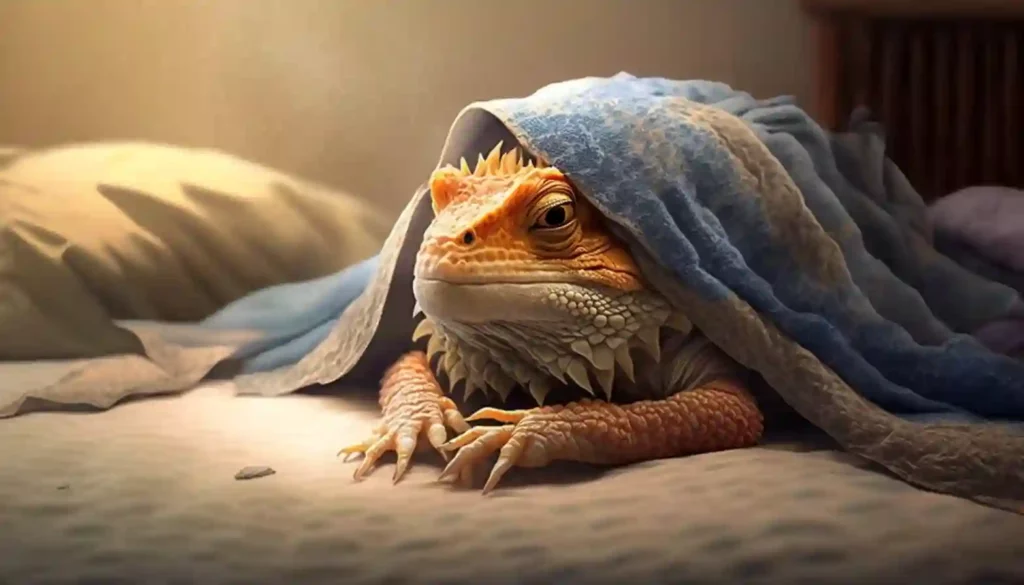
If your beloved pet bearded dragon hasn’t pooped in a month, it’s time to take action.
It is important for you to stay proactive and get the necessary advice from an experienced herpetologist or reptile veterinarian.
Not only will they be able to determine if your bearded dragon has any underlying health issues that are causing the lack of pooping, but they can also provide you with tips on how to help them pass their stool more easily.
It may seem daunting at first, but getting a vet visit is essential when faced with this issue.
A qualified specialist will be able to assess your situation and provide insight into what might be wrong as well as offer solutions.
They could recommend dietary changes or medications like laxatives which may help encourage regular pooping in your beardie.
Additionally, they’ll be able to check for other possible medical conditions that could have led up to this problem such as dehydration, parasites, or obstruction due to ingested substrate materials.
When Is The Right Time To See The Vet?
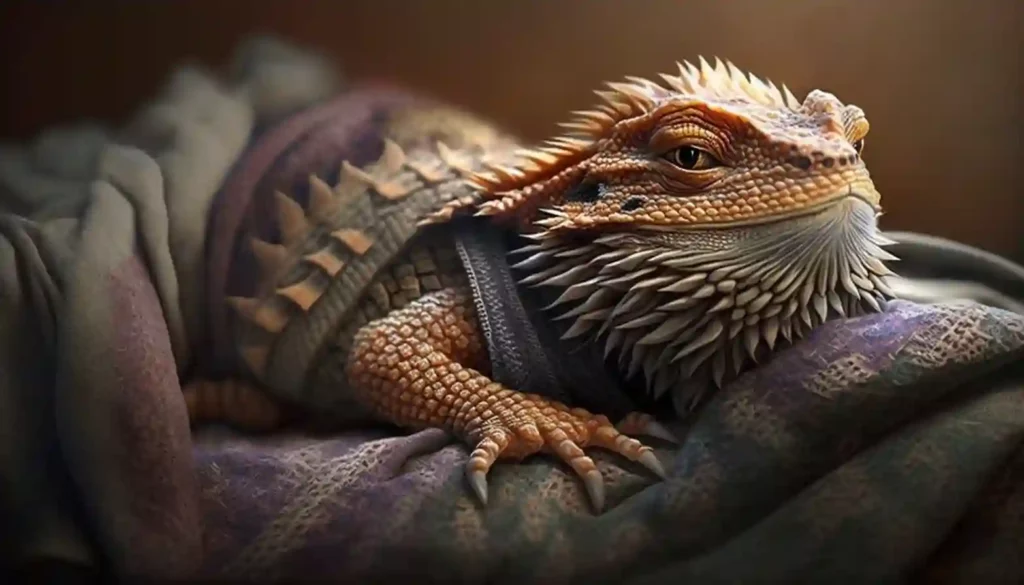
Generally speaking, if you observe any changes in appetite or behavior from your bearded dragon, it may be wise to bring them in for a checkup.
If they are pooping less than usual, this can indicate underlying issues and therefore should not go unnoticed.
It is also advisable that you schedule regular vet visits as part of their overall care routine; these appointments help ensure that any potential problems are caught and treated early on before they develop into something more serious.
Ultimately, you know your pet best so trust your instinct – if something doesn’t feel quite right then don’t hesitate to book an appointment with the vet.
That way, both you and your beloved bearded dragon can enjoy a long and happy life together.
